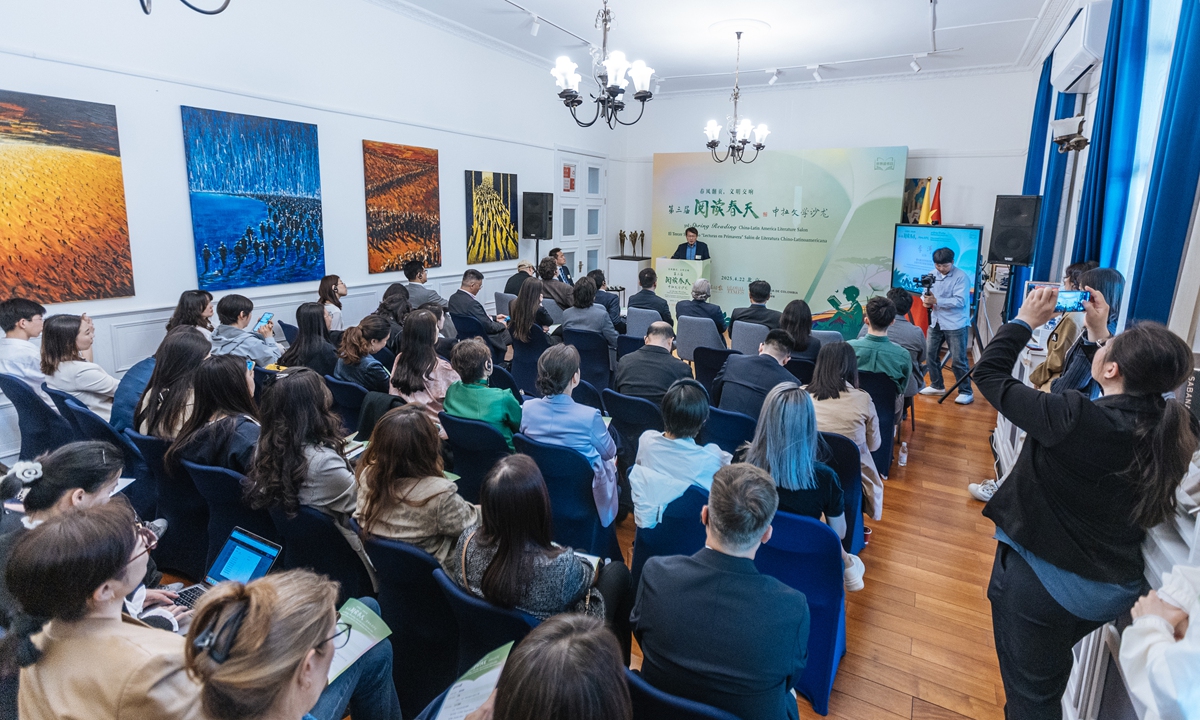ARTS / CULTURE & LEISURE
Borges brings together realities of LatAm, China and Europe in one room

Li Er Photo: Li Hao/Global Times
Editor's Note:In celebration of the 30th World Book Day, the "Spring Reading" - China-Latin America Literature Salon was held by the Global Times and the Embassy of Colombia in Beijing on Tuesday, bringing together leading voices in literary translation and cross-cultural dialogue. Among the participants was acclaimed novelist Li Er, winner of the Mao Dun Literature Prize and chairman of the 7th Beijing Writers Association. In his speech, Li reflected on his first encounter with One Hundred Years of Solitude in the summer of 1985 and how it helped awaken a broader literary movement in China. He discussed the contrast between Chinese and Latin American narrative traditions and the shared mission of writers across the globe.
I remember once having a conversation with some Colombian writers about seven or eight years ago. When I mentioned Gabriel García Márquez, a few young Colombian writers told me that Márquez was already outdated in Colombia. I was very surprised at the time.
I responded that in China, Márquez was far from "outdated." I believe he's not outdated in other countries either, perhaps only in Colombia. A lady from the Colombian Embassy later told me that what I said served as a reminder to those young Colombian writers.
I first came into contact with Latin American literature during the summer of 1985. I brought a copy of One Hundred Years of Solitude with me from Shanghai back to Henan. On the hard-seat train ride home, I opened the book again.
I have to say, it both made me drowsy and filled me with restlessness, because the narrative style of the book was so different from that of Chinese novels. In Chinese literature, we might pass through countless corridors before reaching Pan Jinlian's bedroom, or read through layers of emotional buildup before arriving at the scene where Lin Daiyu buries the fallen flowers. (Pan is a fictional character in Water Margin, one of the Four Great Classical Novels of Chinese literature. And the scene of Lin burying fallen flowers is one of the most poignant and symbolically rich moments in Dream of the Red Chamber, a classic 18th-century Chinese novel, also one of the Four Great Classical Novels.)
But Márquez, in just a few pages, had a family growing tails.
There's a US writer named Norman Mailer, who was also an extraordinary writer. He wrote The Naked and the Dead. He once said that Márquez covers a family with 10 people in it and they go through 20 years and he does it all in five or 10 pages.
"In 10 pages I'm lucky to get around one bend of the Nile. He writes very quickly about a great many things, he has that gift. If I have a gift it is in the opposite direction. I want to catch the slow movement of that Nile," said Mailer.
This stark difference in narrative style compared to Chinese novels was difficult for me to accept at first, yet at the same time, it sparked a strong interest within me.
I felt there was a certain connection between the reality in China and that in Colombia, but I didn't expect there would be that huge an impact. One of the most important literary trends of the 1980s in China, Xungen (root-seeking) literature, can be said to have emerged under the direct influence of Márquez's literary experience.
To be frank, I don't read Márquez much anymore. We all know that Chinese writer Mo Yan was greatly influenced by him. There have been many comparative literature papers published on Mo Yan and Márquez. But how should we view this phenomenon?
When we read a foreign writer, it's not with the goal of becoming that writer. Márquez's influence on Mo Yan did not turn Mo Yan into another Márquez. Rather, it allowed Mo Yan to become, once again, an ordinary person of 21st-century China.
The greatest impact of foreign literature on China is that it helps Chinese writers better find themselves. Márquez's influence on Chinese writers has helped them more clearly recognize the reality they inhabit, and to do so within a global literary context.
It is said that wherever Márquez went, he always carried a novel by Jorge Luis Borges. If Márquez represents literature's engagement with reality, then Borges symbolizes literature's escape from reality. These are two fundamentally different types of writers. Personally, I have been more influenced by Borges.
Currently, I teach at Peking University, and every year I discuss Borges, focusing on two of his short stories: The South and what Borges considered his only love story, titled Ulrikke. In Ulrikke, Borges describes a man and a woman who meet by chance at an inn in Norway. The two of them talk about whether there are still wolves in Europe after the start of the Industrial Revolution, and they also discuss British writer Thomas De Quincey. Later, after they arrive at a room in the inn, Borges writes a description of the inn that, to me, feels remarkably similar to how one might describe a traditional Chinese inn. It was dim and low-ceilinged, with a gabled roof sloping on both sides. The wallpaper was deep crimson, patterned with intertwining fruit and birds. The bed was reflected in a hazy mirror of polished mahogany.
He brought together the realities we've experienced - those of Latin America, China, and Europe, and concentrated them all within a single room. His masterful technique and immaculate prose left a profound impression on me.
Of course, I can think of many other Latin American writers who left a deep impression on me. Whether it's the renowned Mexican poet Octavio Paz, or the later influential author of 2666 and Last Evenings on Earth, Roberto Bolaño, I'm very familiar with their works. Many Chinese readers and writers are, too. But what I want to emphasize now is that both Latin American writers and Chinese writers share a common mission.
We all know how remarkable Márquez is, but he, too, was influenced by Chinese culture. Borges, until the very end of his life, kept gazing eastward. He would touch his cane and smile toward the East. He was deeply fascinated by ancient Chinese philosophy.
Both of Borges and Márquez deeply admired a writer, French author Albert Camus, who once stated that each generation doubtless feels called upon to reform the world.
"Mine knows that it will not reform it, but its task is perhaps even greater. It consists in preventing the world from destroying itself," he said.
I believe that this mission is a shared responsibility among writers, whether they are from Latin America, China, or the West. A writer's duty is to rename the world in their own way, to comprehend the harsh circumstances, the dark side of the world, and to challenge them.

The venue of 'Spring Reading' - China-Latin America Literature Salon Photo: Li Hao/ Global Times



